| AIR & GAS DRYING
SYSTEM |
|
|
|
Products/Packaged
Systems |
|
|
» |
|
|
» |
|
|
» |
|
|
» |
|
|
» |
|
|
» |
|
|
» |
|
|
» |
|
|
» |
|
|
» |
|
|
» |
|
|
» |
|
|
» |
|
|
» |
|
|
» |
|
|
» |
|
|
To proceed for the selection of Air & Gas Dryer, it is recommended
to go through the contents very carefully as explained in the
COMPRESSED AIR SYSTEM.
Air dyer is one of the
most critical and important equipment of an ideal compressed air
system. Most of the times industry selects a dryer according to
the standard model of a dryer of any particular brand without
knowing their actual dryness ( Dew point) required for the
application. As a result of this, sometimes over designed dyer
will unnecessarily cost more in terms of its capital cost,
operation and maintenance cost and sometimes less designed dryer
will lead to frequent application, process and instruments
failure,
Considering the above
Calorie HNT specializes in following type of air dryers.
|
 |
Refrigeration Type |
|
 |
Regenerative Adsorption Type |
|
 |
Membrane Type |
|
|
|
|
Regenerative Adsorption Type is further classified as |
|
 |
Heatless Type |
|
 |
Internally Heated Type |
|
 |
Externally Heated Type |
|
 |
No loss Split Flow Type |
|
 |
Heat of
Compression Type |
|
|
|
|
REFRIGERATION TYPE |
|
|
Principle
The temperature of the compressed air is brought down to 2-3Β° C in
an heat exchanger through a refrigeration cycle. As a result of
cooling moisture present in the compressed air gets condensed and
knocked out in a moisture separator. Dry air having a pressure dew
point (+) 3Β° C is available for use. |
|
 |
|
|
|
|
Process
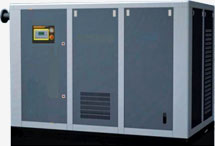 The process is
continuous and non cyclic. The saturated compressed air enters
into a heat exchanger where it is partially cooled by the chilled
air coming out from the moisture separator. This partially cooled
air is further cooled down to (+) 3Β°C in the evaporator of the
refrigeration cycle. A complete refrigeration systems which
consists of a compressor, condenser, expansion valve and
evaporator ensures the continuous cooling of the incoming
compressed air. The systems is automatic with all relevant safety
interlocks and proper instrumentation. The moisture of the
outgoing compressed air is knocked down in a moisture separator
and drained out through and automatic drain valve. The process is
continuous and non cyclic. The saturated compressed air enters
into a heat exchanger where it is partially cooled by the chilled
air coming out from the moisture separator. This partially cooled
air is further cooled down to (+) 3Β°C in the evaporator of the
refrigeration cycle. A complete refrigeration systems which
consists of a compressor, condenser, expansion valve and
evaporator ensures the continuous cooling of the incoming
compressed air. The systems is automatic with all relevant safety
interlocks and proper instrumentation. The moisture of the
outgoing compressed air is knocked down in a moisture separator
and drained out through and automatic drain valve. |
|
|
Specifications |
|
| Capacity |
- |
100 to 15,000 Nm3/hr |
| Pressure |
- |
5 to 16 Bar (g) standard . ( Higher Pressure
on demand) |
|
Pr. Dew Point |
- |
(+) 3ΒΊ C |
|
|
|
It is very important for proper selection of air dryer. Selection
depends upon many factors like capacity, pressure, Temperature,
dew point, location, type of air compressor and mainly the
application. A improper selection may cost in terms of capital
investment and operational cost. Hence it is recommended to
specify the complete details to Calarie HNT and let them suggest a
right kind of dryer. |
| |
|
REGENERATIVE ADSORPTION TYPE |
|
|
Principle
The adsorption type dryers are also termed as desiccant dryers.
Theses type of dryers are usually used where low dew point in the
range (-) 40Β°C ~ (-) 80Β°C is required. A desiccant is used for the
adsorption of moisture. It is twin column and cyclic process. When
one column is in adsorption mode, the other is in regeneration
mode. The regeneration of desiccant is done by heating the
desiccant followed by subsequent cooling |
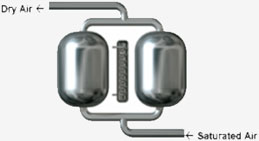 |
| |
|
HEATLESS TYPE |
|
|
The principle is the same as explained above but in this case the
desiccant is regenerated by small quantity of dry air itself.
There is no heating is required, hence it is termed as Heatless.
The dry air required for the regeneration is basically a loss of
dry compressed air which is in tune of 7-12% for a consistent dew
point of (-) 40Β°C. This loss is termed as purge loss. Since there
is loss of dry air , it is only recommended for a smaller
capacities |
|
|
Specifications |
|
| Capacity |
- |
5 to 1000 Nm3/hr |
| Pressure |
- |
5 to 16 Bar (g) standard . (
Higher Pressure on demand) |
|
Pr. Dew Point |
- |
(-) 40ΒΊ C |
|
|
|
|
INTERNALLY HEATED TYPE |
|
|
This type of dryer has electrical heater embedded inside the
desiccant columns. These dryers are most suitable for the
application where very low dew point in the range of (-) 60 ~ (-)
80Β°C is required. Regeneration of the desiccant is done by heating
of the desiccant and purging with the small quantity of the dry
air. |
|
|
Specifications |
|
| Capacity |
- |
50 to 8,000 Nm3/hr |
| Pressure |
- |
5 to 16 Bar (g) standard . (
Higher Pressure on demand) |
|
Pr. Dew Point |
- |
(-) 40ΒΊ C to (-) 80 ΒΊ C |
|
|
|
|
EXTERNALLY HEATED TYPE |
|
|
This type of dryer has electrical heater installed outside the
desiccant columns. These dryers are most suitable for larger
capacities beyond 500 Nm3/hr and for the application where dew
point i(-) 40Β°C is enough. Regeneration of the desiccant is done
by heating of the desiccant and purging with the atmospheric air
from an external air blower. There is NO LOSS of compressed air. |
|
|
Specifications |
|
| Capacity |
- |
500 to 15,000 Nm3/hr |
| Pressure |
- |
5 to 16 Bar (g) standard . (
Higher Pressure on demand) |
|
Pr. Dew Point |
- |
(-) 40ΒΊ C |
|
|
|
|
NO LOSS SPLIT FLOW TYPE |
|
|
This type of dryer similar to externally heated type but there is
no external blower is required. The main stream of the compressed
air is divided into two streams. The main stream enters one of the
drying column and gets dried while a small portion of second
stream is routed trough an external heater and enters into the
second column for regeneration and after regeneration it combines
with the main stream. The regeration is done in a closed loop. In
this dryer one regeneration cooler and one after cooler is used.
These dryers are most ideal for larger capacities beyond 500
Nm3/hr and for the application where dew point i(-) 40Β°C is
enough. |
|
|
Specifications |
|
| Capacity |
- |
500 to 15,000 Nm3/hr |
| Pressure |
- |
5 to 16 Bar (g) standard . (
Higher Pressure on demand) |
|
Pr. Dew Point |
- |
(-) 40ΒΊ C |
|
|
|
|
HEAT OF COMPRESSION TYPE |
|
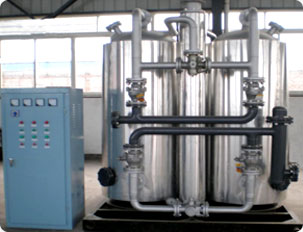 This type of dryer has virtually negligible operational cost as
compared to other dryers. It is again a no loss type and no heater
is required for regeneration. In fact the hot air coming out from
the compressor itself is sufficient for the regeneration. But the
minimum temperature should be 120Β°C. This temperature is not
possible for smaller capacity compressor , hence HOC type dryer is
for larger capacity. This dryer is always installed near the
compressor so as to use maximum heat. In this dryer, first of all
the hot air from the compressor enters into one column and picks
up the moisture of the desiccant and knocks down its moisture
after getting it cooled in a cooler and then it enters into the
second column for drying. The cycle repeats after pre set
intervals. These dryers are most ideal for larger capacities
beyond 500 Nm3/hr and for the application where dew point i(-)
40Β°C is enough. This type of dryer has virtually negligible operational cost as
compared to other dryers. It is again a no loss type and no heater
is required for regeneration. In fact the hot air coming out from
the compressor itself is sufficient for the regeneration. But the
minimum temperature should be 120Β°C. This temperature is not
possible for smaller capacity compressor , hence HOC type dryer is
for larger capacity. This dryer is always installed near the
compressor so as to use maximum heat. In this dryer, first of all
the hot air from the compressor enters into one column and picks
up the moisture of the desiccant and knocks down its moisture
after getting it cooled in a cooler and then it enters into the
second column for drying. The cycle repeats after pre set
intervals. These dryers are most ideal for larger capacities
beyond 500 Nm3/hr and for the application where dew point i(-)
40Β°C is enough. |
|
|
Specifications |
|
| Capacity |
- |
500 to 15,000 Nm3/hr |
| Pressure |
- |
5 to 16 Bar (g) standard . (
Higher Pressure on demand) |
|
Pr. Dew Point |
- |
(-) 40ΒΊ C |
|
|
|
|
EXTREMELY HIGH OR LOW PRESSURE DRYER |
|
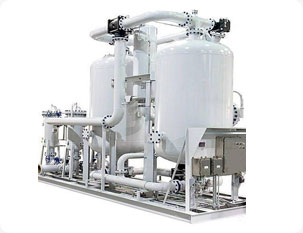 Under this category Calorie HNT has a specific design and the
systems are made as per the individual customers requirement. The
specification under this category Under this category Calorie HNT has a specific design and the
systems are made as per the individual customers requirement. The
specification under this category |
|
Specifications |
|
| Capacity |
- |
50 to 10,000 Nm3/hr |
| Pressure |
- |
0.5 to 300 Bar (g) |
|
Pr. Dew Point |
- |
(-) 20ΒΊ C to (-) 80 ΒΊ C |
|
|
|
|
MEMBRANE TYPE |
|
|
A tube is filled with hollow membranes that allow compressed air
to pass but remove water vapor. These dryers give a -80Β°F dew
point relative to the incoming air temperature. Membrane dryers
have NO MOVING PARTS and require NO ELECTRICITY & MAINTENANCE, and
therefore have a very long life. It occupies 1/10th of the space
as compared to other dryers. There are many model of the membrane
module which depends upon its size and capacity. A combination of
many such modules enhance the capacity and dew point. |
|
|
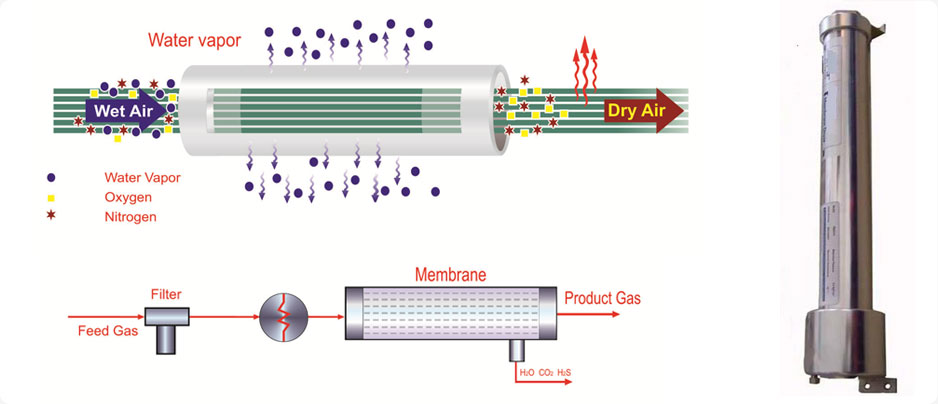 |
|
|
Specifications |
|
| Capacity |
- |
5 to many million Nm3/hr |
| Pressure |
- |
5 to 14 Bar (g) standard |
|
Pr. Dew Point |
- |
(-) 20ΒΊ C to (-) 40ΒΊ C |
|
|
|